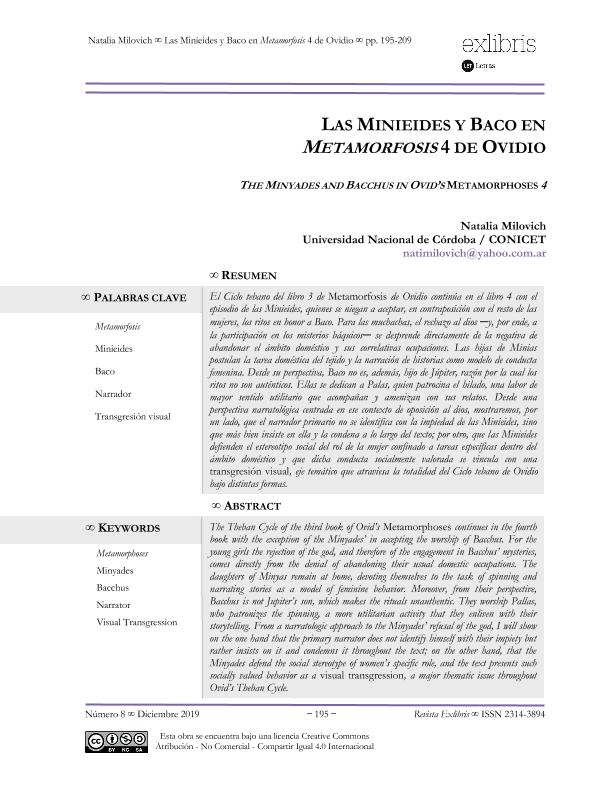Mostrar el registro sencillo del ítem
dc.contributor.author
Milovich, Natalia

dc.date.available
2020-10-06T12:27:33Z
dc.date.issued
2019-12
dc.identifier.citation
Milovich, Natalia; Las Minieides y Baco en Metamorfosis 4 de Ovidio; Universidad de Buenos Aires. Facultad de Filosofía y Letras; Exlibris; 8; 12-2019; 195-209
dc.identifier.issn
2314-3894
dc.identifier.uri
http://hdl.handle.net/11336/115477
dc.description.abstract
El Ciclo tebano del libro 3 de Metamorfosis de Ovidio continúa en el libro 4 con el episodio de las Minieides, quienes se niegan a aceptar, en contraposición con el resto de las mujeres, los ritos en honor a Baco. Para las muchachas, el rechazo al dios ─y, por ende, a la participación en los misterios báquicos─ se desprende directamente de la negativa de abandonar el ámbito doméstico y sus correlativas ocupaciones. Las hijas de Minias postulan la tarea doméstica del tejido y la narración de historias como modelo de conducta femenina. Desde su perspectiva, Baco no es, además, hijo de Júpiter, razón por la cual los ritos no son auténticos. Ellas se dedican a Palas, quien patrocina el hilado, una labor de mayor sentido utilitario que acompañan y amenizan con sus relatos. Desde una perspectiva narratológica centrada en ese contexto de oposición al dios, mostraremos, por un lado, que el narrador primario no se identifica con la impiedad de las Minieides, sino que más bien insiste en ella y la condena a lo largo del texto; por otro, que las Minieides defienden el estereotipo social del rol de la mujer confinado a tareas específicas dentro del ámbito doméstico y que dicha conducta socialmente valorada se vincula con una transgresión visual, eje temático que atraviesa la totalidad del Ciclo tebano de Ovidio bajo distintas formas.
dc.description.abstract
The Theban Cycle of the third book of Ovid’s Metamorphoses continues in the fourth book with the exception of the Minyades’ in accepting the worship of Bacchus. For the young girls the rejection of the god, and therefore of the engagement in Bacchus’ mysteries, comes directly from the denial of abandoning their usual domestic occupations. The daughters of Minyas remain at home, devoting themselves to the task of spinning and narrating stories as a model of feminine behavior. Moreover, from their perspective, Bacchus is not Jupiter’s son, which makes the rituals unauthentic. They worship Pallas, who patronizes the spinning, a more utilitarian activity that they enliven with their storytelling. From a narratologic approach to the Minyades’ refusal of the god, I will show on the one hand that the primary narrator does not identify himself with their impiety but rather insists on it and condemns it throughout the text; on the other hand, that the Minyades defend the social stereotype of women’s specific role, and the text presents such socially valued behavior as a visual transgression, a major thematic issue throughout Ovid’s Theban Cycle.
dc.format
application/pdf
dc.language.iso
spa
dc.publisher
Universidad de Buenos Aires. Facultad de Filosofía y Letras

dc.rights
info:eu-repo/semantics/openAccess
dc.rights.uri
https://creativecommons.org/licenses/by/2.5/ar/
dc.subject
METAMORFOSIS
dc.subject
MINIEIDES
dc.subject
BACO
dc.subject
NARRADOR
dc.subject
TRANSGRECIÓN VISUAL
dc.subject.classification
Otras Humanidades

dc.subject.classification
Otras Humanidades

dc.subject.classification
HUMANIDADES

dc.title
Las Minieides y Baco en Metamorfosis 4 de Ovidio
dc.title
The Minyades and Bacchus in Ovid’s Metamorphoses 4
dc.type
info:eu-repo/semantics/article
dc.type
info:ar-repo/semantics/artículo
dc.type
info:eu-repo/semantics/publishedVersion
dc.date.updated
2020-06-08T13:59:35Z
dc.journal.volume
8
dc.journal.pagination
195-209
dc.journal.pais
Argentina

dc.journal.ciudad
Ciudad Autónoma de Buenos Aires
dc.description.fil
Fil: Milovich, Natalia. Consejo Nacional de Investigaciones Científicas y Técnicas. Centro Científico Tecnológico Conicet - Córdoba. Centro de Investigaciones y Estudios sobre Cultura y Sociedad. Universidad Nacional de Córdoba. Centro de Investigaciones y Estudios sobre Cultura y Sociedad; Argentina
dc.journal.title
Exlibris

dc.relation.alternativeid
info:eu-repo/semantics/altIdentifier/url/http://revistas.filo.uba.ar/index.php/exlibris/article/view/3296
Archivos asociados
